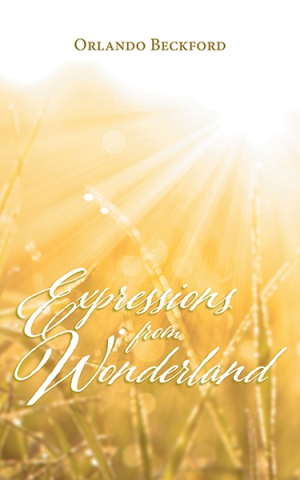
Expressions from Wonderland
Loving and loss are recognized as inevitable in the musing poems of Expressions from Wonderland.
Orlando Beckford’s poetry collection Expressions from Wonderland grapples with the pains and ideals of love in relation to its possibilities.
By examining the axiology between the self and love, the reliable speaker of this collection dissects a wide range of life’s stages and offers ample opportunity for ease, often in stable iambic pentameter and the rhythm of rhyming couplets. The poems celebrate and lament the harmonies found in love’s vibrational balance, drawing parallels between the celestial and terrestrial, humanity and animalistic natures, as well as the speed versus depth to which love can affect a person in a profound manner.
In a fantastical notion, the book exemplifies the magnitude of responsibility in specific titles in a faithful and diligent manner. The pendulum of this work swings between aesthetics and ethics, culminating in descriptions of the desire to possess the ideal divine feminine, who can complete the task of being all to everyone else—a task placed before her own humanity. Using the contrapuntal as a vehicle, the speaker’s unified voice solidifies guardianship and guidance as foundational principles of the mother role in entries like “Characteristics of a Mother,” announcing:
Mother is very special and important. Mother is a queen and a lady,
Your guardian and your best friend, A leader and a teacher.
She protects and guides you through the years. Guidance and counselling she is always giving.
Her love and blessings are endless. Call her when you need someone to talk to.
Side by side, the mother is revered and depended on as a catalyst for growth. This sentiment is reflected throughout the book via pedantic desires to possess women for what one can gain through their interactions, even as perfect strangers.
Although the book honors this utopian vision of the mother, it recognizes that there isn’t a way to confirm such maternal diligence will be rewarded beyond a single life. Thus, it lauds maternal diligence for the moment, functioning as an offering to a singular version of the divine feminine. Prompting metaphysical continuity concerns, “Mystery of Life and Death” further questions the purpose of loving when loss is inevitable, stating:
We can’t stop death.
Or hide from it.
Some are fearful of getting old,
Because to them, it’s getting closer to the grave.
Is there a paradise waiting for the righteous?
The poems investigate how one can manifest the steadfast and immovable traits of unburdened love, given and received, free of epistemic shortcomings. While shooting for the moon, poems like “Times We Shared” express the longing to land on a star alone. And the penultimate poem culminates in the idea that easy rhymes can contribute to conversations of complex forms.
The poems of Expressions from Wonderland are an act of negotiation: between wanting to mold the world, bestowing on it a bootstrap mentality, and the acknowledgement that the moment after such a will to carry on is lost has tide-turning potential.
Reviewed by
Attorious Renee Augustin
Disclosure: This article is not an endorsement, but a review. The publisher of this book provided free copies of the book and paid a small fee to have their book reviewed by a professional reviewer. Foreword Reviews and Clarion Reviews make no guarantee that the publisher will receive a positive review. Foreword Magazine, Inc. is disclosing this in accordance with the Federal Trade Commission’s 16 CFR, Part 255.
